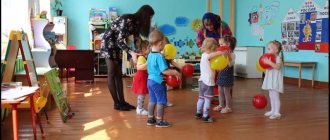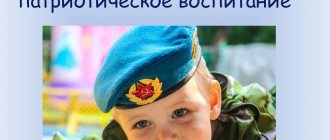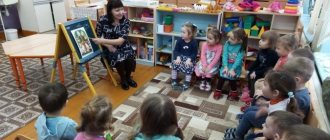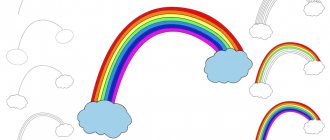Forms of work on patriotic education with older preschoolers
Bibliographic description:
Gromilina, L.V. Forms of work on patriotic education with older preschoolers / L.V. Gromilina, L.V. Kamyzina. — Text: direct // Innovative pedagogical technologies: materials of the VI International. scientific conf. (Kazan, May 2021). — Kazan: Buk, 2021. — pp. 21-23. — URL: https://moluch.ru/conf/ped/archive/214/12271/ (access date: 11/21/2021).
In preschool age, a sense of patriotism begins to form:
- love and affection for the Motherland;
- devotion to her;
- responsibility for it;
- the desire to work is not her good;
- protect and increase wealth.
Love for the Fatherland begins with love for one’s Motherland - the place where a person was born.
In this regard, it is of great importance to familiarize preschoolers with the historical, cultural, national, geographical, natural and ecological uniqueness of their native land.
The basic stage in the formation of love for the Motherland in children should be considered their accumulation of social experience of life in their city, assimilation of the norms of behavior and relationships accepted in it, and familiarization with the world of its culture.
Patriotic education of preschoolers is most successfully carried out through play, object-based activities, communication, work, learning, and various types of activities characteristic of preschool age.
General forms of work with children on patriotic education can be:
- targeted walks;
- excursions;
- child labor;
- visual activity.
How are the tasks of patriotic education solved in educational activities, in games, in work activities? Children gain knowledge about their native country mainly in classes, which can be roughly divided as follows:
‒ activities aimed at giving children specific ideas about their native country based on direct perception (observations, excursions, targeted walks) or indirectly (stories from the teacher, reading works of fiction);
‒ activities that help deepen and systematize children’s knowledge (conversations, didactic games, etc.);
‒ activities during which children use the acquired knowledge and express their attitude to the phenomena of social life (visual activities, creative storytelling),
Their active, varied activities are of great importance for the patriotic education of children, since being a patriot means not only knowing and loving your country, but also actively acting for its benefit. Therefore, when planning work on patriotic education, the teacher certainly outlines what games (role-playing, construction) he can play with children, what he can invite them to do themselves, what themes to give for drawing, appliqué, and design.
Patriotic education includes solving problems not only of moral, but also of labor, mental, aesthetic, and physical education.
Future citizens of the country must grow up strong, agile, and healthy.
Qualities such as strength, courage, and dexterity, necessary for a warrior-defender of the Motherland, are best developed in sports games, as well as in games with military-patriotic content. Interest in them may be aroused by stories about soldiers who showed heroism.
Love for the Motherland becomes a real deep feeling when it is expressed not only in words, knowledge, but also in the desire to work for the good of the Fatherland and take care of its riches.
The child’s work is small and not complicated, but it is necessary for the formation of his personality. It is necessary to encourage the independent work of children, which is based on the desire to do something for the team, for the city, for the kindergarten. Work on landscaping a kindergarten plot, your own street, making toys for kids, repairing books, working in the garden - all these are activities accessible to preschoolers that help to develop civic feelings in children.
The emotional atmosphere in classes and games plays a big role in nurturing children’s feelings. Bright, living words, music, and visual arts help children emotionally perceive their surroundings.
Older children already know about their hometown. They remember the main streets, they are told about the heroes or famous people after whom they are named.
Children's ideas about administrative buildings are being clarified and expanded. The teacher briefly explains why a library, a department store, and a consumer services plant are needed. Excursions to monuments and the obelisk of fallen soldiers are accompanied by a more detailed commentary. During walks, children observe the construction of new houses, the improvement of the city, and can take part in community cleanups as much as they can (help plant seedlings, water flowers, rake leaves).
The teacher should not limit the range of interests and ideas of children of the sixth year of life only to their close geographical surroundings. In accordance with the program, children in the senior group are given fairly broad knowledge about their native country. For this purpose, new topics are proposed that deepen and expand knowledge about our native country - “Russia is my homeland”, “Cities of Russia”, “Moscow is the capital of our Motherland”.
In senior preschool age, the study of the topic “City - Village” continues. Along with these concepts (village, city), children must learn the new concepts of “capital”, “region”, “country”; they must know what is bigger - a village or a city, a country or a region.
At an older age, knowledge about Russian cities expands. Children’s ideas about the cities of our country make it possible to organize interesting games, “Travels around the native country.” These games include children's construction and independent artistic activities, and are therefore interesting and exciting for children. Stories and conversations about the climatic and natural zones of our country will help deepen interest in your native country. Interest in classes on the geography of their native country increases if the teacher tells them about their peers - boys and girls living in the north and south - in the tundra, taiga or desert. These stories about children instill in children goodwill and sympathy for peers living far away from them.
An interesting form of work is the correspondence of children with peers from other cities.
Older children are interested in events that occur not only in their hometown, but throughout the country, discuss some of them with their peers, and ask adults numerous questions. Such events that interest children are space flights.
The children, under the guidance of adults, collect photographs of astronauts, badges, newspaper clippings and magazines that talk about space flights. The teacher must support and deepen children's interest in astronauts and their work.
The group library should have several books about space heroes, as well as albums made by the children’s hands, and children’s drawings on this topic.
Children’s sense of involvement in the events taking place in their native country is also formed during the teacher’s stories about the high moral qualities of Russian people. The material for such stories can be essays from newspapers and magazines.
In older preschool age, children's knowledge of great Russian writers, artists, and composers deepens. Children should know certain works written by A. S. Pushkin, L. N. Tolstoy, P. I. Tchaikovsky, recognize them in portraits; know some facts of their biography.
Children also continue to get acquainted with the works of great masters of the brush. Children of this age can perceive rather complex works of art and understand the mood conveyed by the artist.
The classes are very interesting, where reproductions of Vasnetsov’s paintings “Alyonushka”, “Bogatyrs”, “The Frog Princess”, “The Snow Maiden” are examined. The children are familiar with fairy tales based on which these works were written, and they immediately recognize their heroes.
All this enriches the thoughts and souls of the children and teaches them to be proud of the culture of their great country.
In the patriotic education of preschoolers, it is recommended to use the following forms of work:
- extracurricular activities (conversations, games);
- all types of artistic creative activities;
‒ holding joint holidays (Maslenitsa, Christmas, Easter);
‒ watching films, using audio recordings and technical teaching aids;
- excursions, targeted walks around the city;
- children's charity;
- theme evenings;
‒ organization of exhibitions (joint activities of children and parents);
Thus, the program traces several areas of work:
- Spiritual and educational (classes, conversations, reading);
- Educational and recreational (holidays, outdoor activities, role-playing, construction games, walks, excursions, hikes);
- Cultural and educational (meetings, concerts, watching filmstrips);
- Moral and labor (self-service work, cleaning the group and territory, work based on interests, productive activity, making gifts for the holidays).
The following forms of work with parents are offered:
- Parent meetings.
- Consultations.
- Open classes.
- Carrying out joint events (exhibitions, competitions, holidays).
- Visual types of work (information stands for parents, moving folders, exhibitions of children's works, educational games, literature).
Literature:
- Magazine “Preschool Education” No. 6 2003, No. 5 2004
- Zhukovskaya R.I. Native Land - 3rd ed., revised. and additional - M.: Education, 1990. - 176 p.
- https://raguda.ru/sk/patrioticheskoe-vospitanie-doshkolnikov-po-fgos.html
- Yaseva N. Yu. Education of the fundamentals of patriotic feelings in preschool children. — Mogilev: Moscow State University named after. A. A. Kuleshova, 2000. - 132 p.
Key terms
(automatically generated)
: home country, child, game, patriotic education, city, activity, kindergarten, visual activity, hometown, older age.
Card index of conversations on moral and patriotic education card index (preparatory group)
Card index of conversations on moral and patriotic education
The problem of moral and patriotic education is currently particularly relevant and is of great importance in the development of the personality of a child - a future citizen of the country.
Card-1
Conversation “Holiday in my family”
Goal: Invite children to talk about the traditions and customs of celebrating the holiday in their family. Deepen children's understanding of family relationships, introduce them to cultural norms and traditions, and develop sociocultural competencies.
Card-2
"Russia is my Motherland"
Goal: to expand children’s ideas about their native land, to deepen and clarify their idea of the Motherland - Russia. To consolidate knowledge about the flag, coat of arms and anthem, about the capital Moscow, about your small homeland - Nizhny Novgorod. Improve dialogic and monologue forms of speech. To cultivate patriotic and international feelings, love for the native land, for the homeland.
Card-3
"Proverbs about the Motherland."
Goal: Continue to introduce children to types of oral folk art: proverbs and sayings; pay attention to the ability of the Russian people to notice and accurately, vividly express in words what they noticed. Cultivate interest in the creativity of the Russian people.
Card-4
“Where does the Motherland begin?”
Reading the poem by M. Matusovsky “Where does the Motherland begin?”
Goal: To help children understand the concept of Motherland and the reasons for a person’s love for it. Formation of a feeling of love and pride for one’s Motherland.
Card-5
"State symbols of Russia"
Goal: To form in children basic concepts about the symbols of the state as a universal, state value. Foster respect for the symbols of your state.
Card-6
"Coat of arms of the city"
Goal: To tell children about the functional meaning of the coat of arms, to give an idea of its history, to tell about what is depicted on the city’s coat of arms. To improve children's knowledge about the symbols depicted on the coat of arms, to reveal what they mean. To instill patriotic feelings in children.
Card-7
“Moscow is the capital of our Fatherland”
Goal: to give children an idea that Moscow is the largest city in our country; bring to the understanding that this is the main city of our Motherland, the capital. Foster respect for state symbols, traditions and customs of your people. To cultivate a love for Moscow and Russia in general, broaden one’s horizons, pass on knowledge about history and sights. Foster a sense of pride for your people, patriotic feelings. To foster interest in the history of the city and country, love for their Motherland, to evoke in children a feeling of admiration for the beauty of their native nature and the talent of the Russian people.
Card-8
"Planet Earth is in danger"
Goal: to promote the formation of children’s ideas that planet Earth is a huge ball (most of the globe is covered with water - oceans and seas, in addition to water there are continents - solid earth, land where people live). To contribute to the generalization of knowledge that many living creatures live on planet Earth, that they all need clean water, clean air, clean land. To form the idea in children that planet Earth is now in danger. To cultivate a love for nature, proper communication with it, a desire to study it.
Card-9
"Day of Knowledge"
Goal: to clarify and systematize children’s knowledge about the holiday - Knowledge Day, September 1. Explain to children that this holiday is the beginning of the school year, not only in schools, but also in kindergarten. Expand children's understanding of the profession of a teacher, educator, and educational institutions (kindergarten, school, college, university). Form friendly, friendly relationships between children. To develop aesthetic feelings, to arouse the desire to maintain cleanliness and order in the group, on the site. Foster respect for the work of kindergarten employees.
Card-10
"Mothers Day"
Goal: to consolidate children’s knowledge about the public holiday “Mothers’ Day”. Teach a kind, attentive attitude towards your mother. To form warm feelings for the dearest person, your mother. Cultivate a sense of kindness, respect, responsiveness, love. Teach children to maintain a conversation and express positive emotions.
Card-11
"New Year"
Goal: to expand children’s understanding of the New Year holiday and the traditions of celebrating the New Year in our country. Continue to introduce the origin story of the fairy-tale characters Father Frost and Snow Maiden. Tell us about the traditions of celebrating the New Year; cultivate a love of Russian history and national pride; cultivate a love for Russian folk art. Develop the ability to maintain a conversation.
Card-12
"Maslenitsa"
Goal: to continue to introduce children to the holiday - Maslenitsa. Develop interest in Russian folk holidays, introduce them to the traditions of Russian and Kuban culture. To cultivate a sense of respect for the folk traditions of Russian culture.
Card-13
"Our Army".
Goal: to give children knowledge about the army, to form their first ideas about the branches of the military, about the defenders of the Fatherland. Introduce children to military equipment. Foster love for the Motherland and a sense of pride in your army. Cultivate a desire to be like strong Russian warriors.
Card-14
"March 8"
Goal: to attract children’s attention to the “March 8” holiday and develop their interest in the tradition of its celebration. Cultivate a respectful, gentle and noble attitude towards mothers and grandmothers. A caring and sensitive attitude towards the entire female sex, the need to please loved ones with good deeds. Deepen children's knowledge about the role of mother and grandmother in their lives; contribute to the creation in children of positive emotional experiences and a joyful mood from the holiday. Develop the ability to maintain a conversation. Encourage attempts to express your point of view, agreement or disagreement with a friend’s answer.
Card-15
"First Cosmonaut"
Goal: to continue to acquaint children with the feat of Yu. A. Gagarin and its significance for humanity. Enrich children's ideas about space, astronauts, space equipment, and the use of space for the benefit of people. Develop cognitive interest in space as an object of the surrounding world. Initiate children's activity and desire to learn new things about space. Foster a sense of pride in your country. Develop the ability to maintain a conversation. Improve the dialogical form of speech.
Card-16
"Victory Day"
Goal: to continue to acquaint children with the history of their country, with the defenders of the Fatherland. To consolidate children's knowledge of how Russian people defended their Motherland during the Great Patriotic War. Develop children's speech and thinking, the ability to argue their statements. To cultivate a sense of respect for veterans of the Great Patriotic War, a desire to take care of them.



